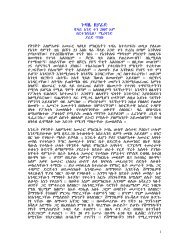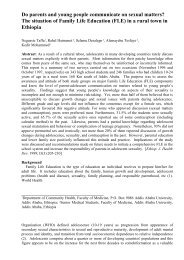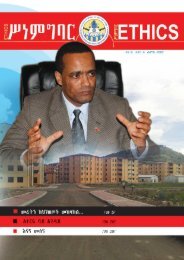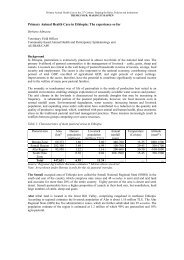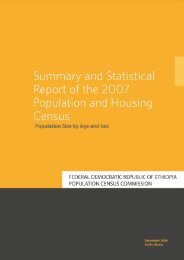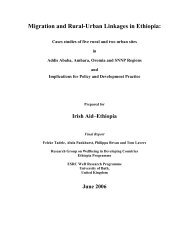Original article - Ethiopian Review
Original article - Ethiopian Review
Original article - Ethiopian Review
- No tags were found...
Create successful ePaper yourself
Turn your PDF publications into a flip-book with our unique Google optimized e-Paper software.
<strong>Original</strong> <strong>article</strong>The nominal group technique for participatingcommunities in analyzing rural town water andsanitation situationSolomon Demamu 1 , Shabbir Ismail 1 and Mekonnen Yihdego 2Abstract: To explore sanitation problems and their causes, a series of independent groupdiscussions was conducted with residents of a rural town stratified into seven social levels usingthe Nominal Group [Discussion] Technique (NGT).Indiscriminate open field defecation and garbage disposal were the two most mentioned andranked problem items followed by unsanitary food and drink services. The top identified causeitems were absence of public latrines, failure of the municipality to control town sanitation andabsence of solid waste disposal facilities.A Combined group gave the highest Median Agreement Score (MAS) of 10. The smallestmedian agreement was scored by Youth and Health workers' groups (MAS=6.5) for mentioned,and by youth and Ordinary residents'groups (MAS=4.5) for ranked problem items. Health workers'group (group 7) ranked MAS of 5.The MAS for causes of sanitation problems of the Combined group was 8 for mentioned, andMAS of 4 for ranked items.Development workers ought to give due recognition to communal stratification when makingneed assessment for better realignment of diverse view points and interests during projectdevelopment. Modifying and validating NGT for a broader use in assessing community healthproblems and needs is suggested. [Ethiop. J. Health Dev. 1997;11(1):37-42]IntroductionPoor environmental sanitation and lack of safe and adequate water supply are known to adverselyaffect human health(1,2,3). At present, the sanitation and water supply situation in most <strong>Ethiopian</strong>towns, including the capital Addis Ababa, is very poor(4).To improve this situation, the search for a practical and acceptable method of communityparticipation is vital(4,5,6). The first essential step in community participation is intensiveconsultation with the community(7).Different approaches of community participation and consultation have been used inenvironmental health activities(8). These include seeking contribution , forming self help groups,deploying community specialized workers and mass action. Consultations have been done bysimply talking to local officials, influential people, interviewing all or a segment of the residentpopulation or by calling public meetings.Communities in both small and large towns are composed of families and groups of diversePsycho- socio-cultural, demographic, economic and political backgrounds(8,9). This stratificationcan represent a more or less distinct spheres of interest which merge as one on some and conflicton yet other communal issues.Despite underdevelopment of health services management and incorrect community participation


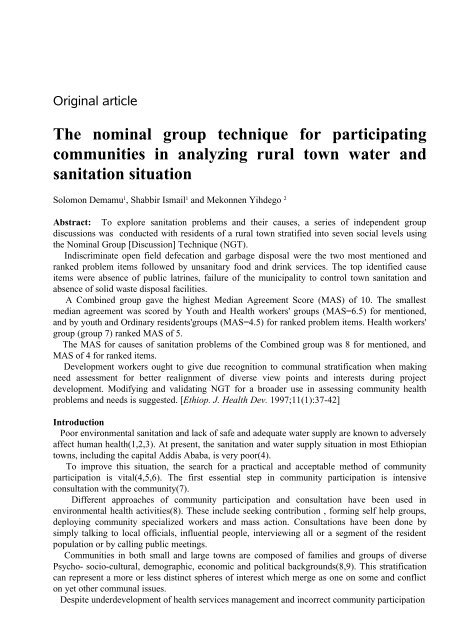

![to read the full report [pdf, Amharic] - Ethiopian Review](https://img.yumpu.com/52737829/1/190x245/to-read-the-full-report-pdf-amharic-ethiopian-review.jpg?quality=85)
